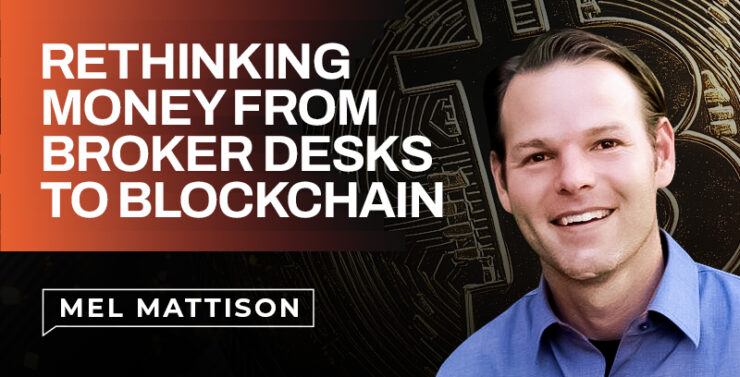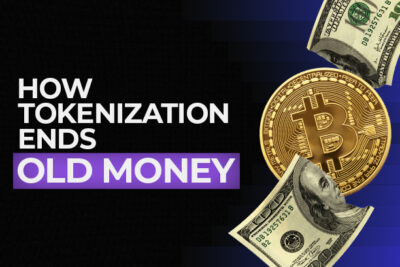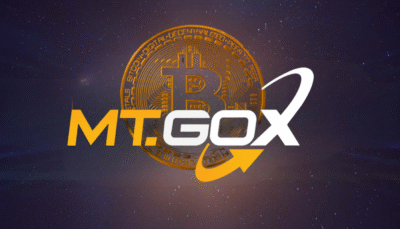Some people spend their careers reinforcing the walls of traditional finance. Mel Mattison has spent his dismantling them brick by brick. As a veteran broker-dealer CEO, early advocate for private share liquidity, and outspoken financial philosopher, he has a track record of seeing around corners. Now, as blockchain meets TradFi in earnest, he’s one of the few voices willing to admit that the old world is never coming back.
Before turning his focus to the future of tokenized markets, Mel Mattison built a career at the heart of traditional finance. With an MBA from Duke and early roles at Russell Investments and United Capital (later acquired by Goldman Sachs), he rose to lead three SEC-registered broker-dealers—SecFi, Vested, and Equitybee—firms that specialized in private equity and the complex transfer of private shares.
“Where I really got my bread and butter was running broker-dealers,” he recalled during his recent appearance on the Coinrock Show
“These were broker-dealers that specialized in transfers of private shares…this is stuff that people have been thinking about for years.”
His fascination with the hidden plumbing of finance inspired his book, Quoz: A Financial Philosophy Memoir, where he explores how money, regulation, and narrative collide to shape economic reality. The title—Quoz—reflects Mel’s view that finance is as much about illusion as it is about numbers, a perspective that still guides his work at the intersection of traditional markets and the blockchain future.
In Quoz, Mel draws on his years inside the engine room of finance to challenge the accepted wisdom that markets are purely rational and efficient. He unpacks how incentives, narratives, and historical contingencies shape everything from monetary policy to household debt—and why it’s dangerous to assume any of it is permanent.
A Legacy Written in Broker Licenses
Long before Bitcoin, Mel was building businesses around the hidden plumbing of capital markets. He led three separate SEC-regulated broker-dealers—SecFi, Vested, and Equitybee—specializing in unlocking the value of private share. If you were an early employee at a unicorn like SpaceX or OpenAI, chances are you benefited from the same mechanics Mel spent years refining: secondary sales, trust transfers, and the clever navigation of “magic clauses” buried in ESOP agreements.
“We had to go through a lot of stuff. We had to understand because a lot of these companies had You know transfer restrictions,” he explained.
“We had something we called the magic clause and there was a magic clause in a lot of these ESOP plans so their employees like option purchase plans and they would essentially forbid transfer.”
But for all the complexity, Mel always saw something simpler beneath it: a system designed to exclude. For generations, only the wealthy—family offices, institutional investors, billionaires—could access pre-IPO opportunities. Ordinary investors were boxed out under the guise of “protection.” To Mel, it was never about safety. It was about control.
“These are things that the big companies and rich people get first,” he said.
“And it’s always been that way.”
The Copernican Break: From TradFi to On-Chain
If there was a moment that perfectly captured Mel’s philosophy colliding with reality, it came when Robinhood announced tokenized trading of U.S. stocks. Most market observers treated the news as a curiosity or marketing ploy. Mel saw a revolution.
“This is the most game-changing moment of my entire career,” he declared.
“People don’t get it yet, but this is a Copernican break. We’re moving from an earth-centric universe to a solar-centric universe.”
In other words: the center of financial gravity was shifting. Where old finance relied on street-name custody and slow settlements—T+3, then T+2, now T+1—on-chain ownership removes the middlemen. Instead of relying on the Depository Trust & Clearing Corporation (DTCC) and its subsidiary Seed&Co to record who actually owns a share, a blockchain can hold the record in real time. No intermediaries. No float to collateralize. No hidden fees.
Mel had spent over twenty years building businesses around those legacy mechanics. Yet here he was, championing their obsolescence with almost religious conviction.
“If you go to the true blockchain ownership of a security, you’re revolutionizing everything,” he said.
“It’s not about two trillion in Bitcoin. It’s about 100 trillion in global equities.”
A Different Lens on Money and Value
For Mel, money itself is more myth than fact—a belief system everyone pretends is stable. His contrarian perspective comes from decades of wrestling with markets and a lifetime of questioning consensus. He’s studied Mises and Rothbard. He’s also immersed himself in Modern Monetary Theory. He owns silver bars but believes fiat will be here forever. It’s a set of contradictions that only make sense if you share his basic premise: most people are operating from the wrong first principles.
“I think we live in a Maya world—an illusion,” he explained.
“There’s this idea that if the Federal Reserve raises interest rates, it tamps down the economy. I think that’s a complete illusion. It actually stimulates it by handing out trillions to baby boomers in money market funds.”
It’s why Mel is not a doom prophet, even as he forecasts a decade of extraordinary monetary expansion. He believes asset prices are just getting started. In his view, a 20,000 S&P and $250,000 Bitcoin are not pipe dreams—they’re the rational outcome of a system that can’t stop printing.
“People think we’re spending too much on debt…don’t they understand it’s fiat? It’s not real,” he said.
“You can print it. The government is never going to run out of money.”
But he’s no naïve cheerleader. While he predicts massive wealth creation, he’s equally convinced it will deepen inequality and spark social unrest. It’s the price, he argues, of a system that decouples money from scarcity.
The Democratization Promise—and the Risk
If there’s a through line in Mel’s story, it’s a belief that access matters. When he talks about democratizing private share ownership or enabling 24/7 trading, he’s not just referencing tech progress—he’s calling out a system that infantilizes retail investors.
“It treats you like a child,” he said, describing how traditional brokers still block clients from buying leveraged ETFs or participating in certain funds.
“You can walk into a racetrack and bet $5 on a horse, but you can’t buy a BlackRock mutual fund on your own. It’s absurd.”
He sees on-chain markets as the antidote: a place where barriers fall, intermediaries shrink, and any investor can finally play on the same field as institutions. But he’s also quick to note that risk doesn’t go away—it just becomes more transparent. He doesn’t encourage reckless speculation. He simply wants the option to exist for everyone, not just the connected few.
“I’m not telling anybody to go out and start buying private shares, and they’re going to make millions,” he clarified.
“This is just bringing the possibility.”
Betting on a Boom, Not Doom
Even as he critiques regulators, Mel retains an optimism that can sound almost radical in an age of perpetual crisis headlines. He sees the coming years as the most exciting time in markets since the 1920s—and he thinks the only real mistake investors can make is clinging to old narratives.
“You sound smarter when you’re predicting collapse,” he said.
“But I think we’re heading for a boom, not doom.”
It’s why he calls himself a financial philosopher. To Mel, money isn’t merely about returns—it’s about understanding the illusions baked into every ticker and headline. And the only way to thrive is to question them.
“Even though people sound smart—and they are smart—if they’re operating from the wrong first principles, they’re going to be wrong,” he said.
“That’s why an idiot like me can make better calls than some of these big shots.”
Where to Find Mel Mattison
X (Twitter): @MelMattison1
Website: melmattison.com





